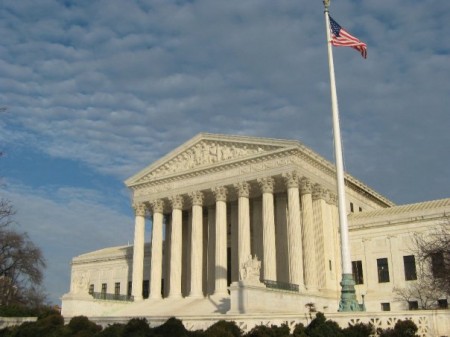The U.S. Supreme Court killed the last best legal hope that opponents of gay marriage had on Monday. By choosing not to hear appeals from five states that had already had their gay marriage bans overturned by lower federal courts, the U.S. Supreme Court essentially sealed the fate of the movement to stop gay marriage in America. Right now, gay marriage is legal in 19 U.S. states and Washington D.C., but this ruling by the Supreme Court will lead to the legal recognition of gay marriage in 11 additional states. That means that there will now be only 20 states in the nation where gay marriage is illegal, and each one of those state laws is currently being challenged legally. At this point, no state law banning gay marriage has been upheld by a federal appeals court. That means that the remaining laws prohibiting gay marriage will probably now be chipped away one by one.
This decision by the Supreme Court on Monday came as quite a surprise to many people. The following is how USA Today summarized the short-term legal implications of this decision…
The court said Monday it would not hear appeals from five states whose same-sex marriage bans had been invalidated by lower federal courts. The decision, issued without explanation, will lead to recognition of gay marriages in 11 more states. It also allows an avalanche of legal challenges to the remaining bans to keep going forward in state and federal courts, where gay and lesbian couples have overwhelmingly prevailed.
Of course it is still possible that a federal appeals court in a conservative area of the country could decide to uphold a gay marriage ban. If that happens, that would likely send this issue back to the Supreme Court once again.
But for now, the gay community in America is rejoicing. The following is how the New York Times described the excitement of one gay couple in Utah…
When Gregory Enke heard the news on Monday morning, he woke up Ariel Ulloa, his partner of eight years, and they rushed to the second floor of a drab government building here to get married.
Mr. Enke, who was forced to leave the Mormon Church after leaving his longtime wife and living openly in a gay relationship, said it felt like vindication.
“I was in shock,” he said. “I started to shake. I was just sobbing. I didn’t want to wait anymore.”
Scenes of exultation unrolled across five states on Monday as county clerks in Indiana, Oklahoma, Utah, Virginia and Wisconsin responded almost instantly to the Supreme Court decision and same-sex couples rushed to obtain legal marriages that had long seemed like a distant mirage.
On the other side, many advocates of traditional marriage were extremely disappointed. Here is one example…
The Family Research Council, a conservative public policy and lobbying organization, said voters were having their rights infringed.
“Unfortunately, by failing to take up these marriage cases, the high court will allow rogue lower court judges who have ignored history and true legal precedent to silence the elected representatives of the people and the voice of the people themselves by overturning state provisions on marriage,” Family Research Council President Tony Perkins said.
What gets lost in all of the legal arguments sometimes is the fact that how Americans view gay marriage has radically changed. At one time, Americans were overwhelmingly against it. Now, they are overwhelmingly in favor it.
For example, a CBS News/New York Times poll in September asked the following question…
“Do you think it should be legal or not legal for same-sex couples to marry?”
56 percent of those that responded said that it should be legal, and only 37 percent of those that responded said that it should not be legal.
An ABC News/Washington Post poll taken at the end of May came up with similar results.
This is the question that was asked…
“Overall, do you support or oppose allowing gays and lesbians to marry legally?”
56 of those that responded said that they support gay marriage, and only 38 percent of those that responded said that they oppose gay marriage.
A survey conducted by Gallup back in May was a little bit closer.
This is the question that was asked for that survey…
“Do you think marriages between same-sex couples should or should not be recognized by the law as valid, with the same rights as traditional marriages?”
55 percent of respondents said that they should be valid, and only 42 percent of respondents said that they should not be valid.
But what is so striking about the Gallup numbers is how far they have moved over the years.
When asked the same question back in 1996, only 27 percent of Americans said that gay marriages should be valid and a whopping 68 percent of Americans said that they should not be valid.
As you can see, attitudes toward gay marriage have undergone a cataclysmic shift in this country over the past couple of decades.
At one time Americans were so overwhelmingly against gay marriage that most people just assumed that it would never be legalized in this nation.
But now Americans are so overwhelmingly in favor of gay marriage that most people just assume that it will soon be legal in all 50 states.
So what do you think?
Is America never going back?
Should gay marriage be legal in all 50 states?
And is this a good thing or an absolutely terrible thing for our society?
Please feel free to share your opinion by posting a comment below…
(Originally posted at End of the American Dream)
